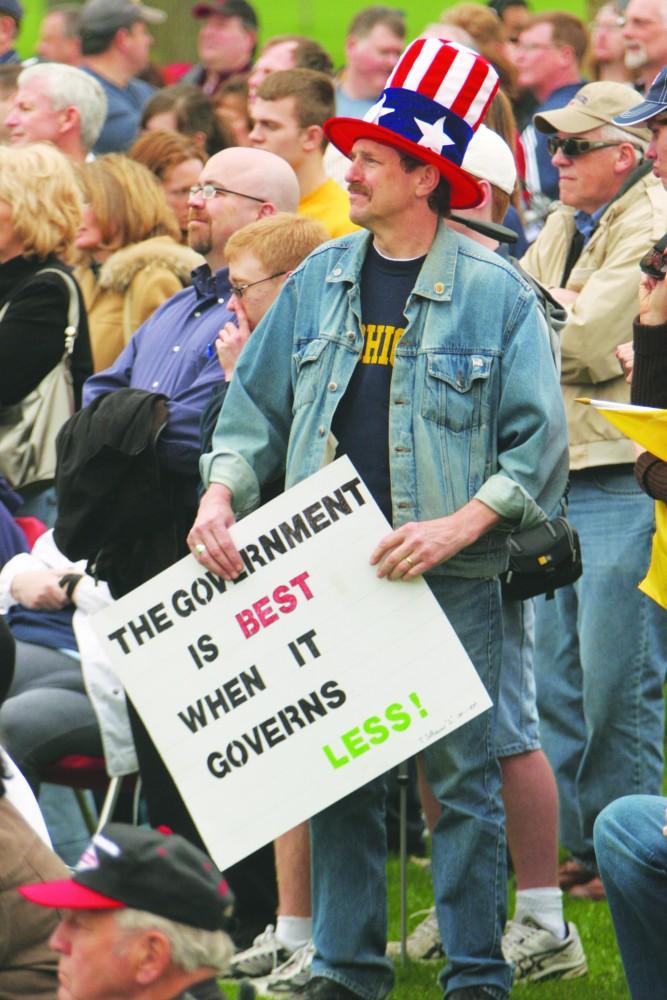Tea Party Express stops in Grand Rapids

The right wing Tea Party Express made a stop at Riverside Park in Grand Rapids Saturday. Candidates and other speakers addressed a crowd of about 1,500 people who vehemently oppose recent legislation enacted by President Barack Obama’s administration. Michigan gubernatorial candidate (Oakland County Sheriff) Mike Bouchard and Republican congressional candidate Bill Huizenga attended the rally.
Apr 12, 2010
Most everyone has seen their pun-laden signs and heard their calls for the federal government to stop ruining, destroying or even interpreting the U.S. Constitution, but what really makes the members of the Tea Party movement so upset?
“It’s more than just taxes; it’s the general attitude of government,” said Bill Huizenga, a Republican running for Michigan’s 2nd congressional district’s U.S. House of Representatives seat. “People are frustrated. They don’t feel their government is listening to them.”
The Tea Party Express, the right-wing movement’s 19-day nationwide tour, made six stops in Michigan during the weekend. On Saturday, the political-rally-on-wheels attracted self-proclaimed independents, constitutionalists, conservatives and even a handful of Republican politicians to Grand Rapids’ Riverside Park.
Gubernatorial candidate Mike Bouchard, sheriff of Oakland County, shares many of the movement’s political qualms.
“I’m sick of what’s going on in Lansing and in Washington,” Bouchard said. “They are spending our future. It’s not just ‘Obamacare;’ it’s everything.”
Both Huizenga and Bouchard said they attended the event because it attracted voters who are usually hard to reach.
“It’s a lot of people that are the type that aren’t involved in politics but care deeply about their country,” Bouchard said.
Republican candidate for governor and Attorney General Mike Cox, who is suing the federal government after the passage of the health care bill, said the Tea Party movement was a sign that “freedom is starting to fight back” against a “Godzilla” of a federal government.
“Like most of you, I’m a little PO’ed,” Cox said. “When I turn on the T.V., I see a federal government that is doing things it’s never done before.”
GVSU senior Alicia Richards volunteered Saturday to gather signatures so that November’s ballot includes an initiative to exempt Michigan from health care reform.
“Getting involved is really important to me,” Richards said. “I’m hoping to go on to international public relations and do this at the international level.”
The Tea Party movement in Arizona has taken similar steps to exempt their state from health care reform.
Experts have said federal law would probably trump any such action by a state.
Humble Beginnings
Although the “silent majority” has long been an influential force in American politics, the Tea Party movement just recently gained steam during the 2008 presidential election.
Mark Petzold cofounded the Tea Party of West Michigan with three others last spring.
“I had decided back in the summer of ’08 that I had to do something besides just vote,” Petzold said.
Now, the group’s Web site, http://www.teapartyofwmi.org/, boasts 1,370 members.
Petzold said the group aims to improve the country by fixing what he calls the real cause the United States’ problems – a lack of education.
“If people understood what this county was founded on and what our Founding Fathers intended, we wouldn’t be in this situation,” he said.
Unlike some members of the Tea Party movement, Petzold is not afraid to express the extent of his discontent.
“Even people in our movement say we aren’t angry, but we are angry,” he said. “Our country is falling apart.”
But some, including CBS in a recent online poll, have questioned whether the movement’s acrimonious rhetoric encourages violence. After congress passed health care reform, some Democratic members received threatening phone calls and had bricks thrown through their office windows. More recently, a group calling itself the Guardians of the Free Republics sent letters to the offices of Gov. Jennifer Granholm and other governors, threatening them to vacate office or face forcible removal.
“It’s an interesting dynamic,” Petzold said. “We don’t want to come across as irrational maniacs. We’re just average Americans saying enough is enough. What (the government) is doing is not just wrong but dangerous.”

























